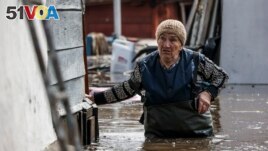11 April 2024
Cities and towns in western Russia and Kazakhstan are facing heavy flooding.
Europe's third-longest river, the Ural, burst a dam causing floods that have forced over 110,000 people to flee and left parts of the Russian city of Orenburg under water.
Russian officials helped displaced homeowners as water levels rose on the Ural River, officials said Wednesday. Russia's government has declared the situation a federal emergency.

A woman walks near her house in a flooded area in Orenburg, Russia, Wednesday, April 10, 2024. (AP Photo)
The river's water level in the city of Orenburg was above 10 meters Wednesday, state news media reported. Photos shared by Russian news services showed roads covered in water, flooded fields and houses partly under water.
People in Orsk gathered in a rare protest on Monday. They were calling for compensation after their homes were damaged. Protests are unusual in Russia, where officials have suppressed dissent following the invasion of Ukraine.
Here are some details about what is happening and why:
Which areas are affected?
The worst hit areas in Russia are south of the Ural Mountains, about 1,200 kilometers east of Moscow. Officials declared emergencies in the Orenburg and Kurgan regions of the Urals and in the Tyumen region of Siberia.
In Kazakhstan, cities in the west and north were hit hard. There were also reports of flooding in the east. Most of the areas border Russia and are crossed by major rivers.
What are the human and economic impacts?
So far, more than 96,000 people have evacuated in Kazakhstan, and at least 12,000 people evacuated in Russia. Reports say about 10,500 homes have been flooded in Russia and more than 3,000 homes in Kazakhstan.
Russia's Orsk oil refinery had been closed to avoid environmental damage.
Heavy property damage has also been reported. Some of the flooded areas are important to wheat production. Russia is the world's biggest wheat exporter.
Over 8,000 farm animals have been killed by floods in Kazakhstan. The agriculture ministry has deployed a special group to remove dead animals to prevent the spread of disease.
What is the cause of the flood?
Spring flooding is common across Russia. The winter snows melt causing the water levels of the rivers of Russia and Central Asia to rise. This year, a combination of influences led to unusually severe flooding.
Russian emergency officials said the soil was waterlogged before winter and then was frozen under heavy snow. The snow melted quickly as spring temperatures rose. There also was a lot of rain in the spring.
Vladimir Yakushev is the Presidential Plenipotentiary in the Urals Region. Russian media said he suggested that Kazakhstan was to blame for not coordinating the release of water more effectively.
Following the protests in Orsk, Russian state news agency Tass reported that the governor of the Orenburg Region promised compensation payments to those affected. They include $108 a month for six months to people forced out of their homes by the floods.
Officials launched a criminal investigation into suspected construction violations that may have caused the Ural dam to break.
Local authorities said the dam could withstand water levels up to 5.5 meters. On Sunday, Russia's water level information site AllRivers said the level in Orsk reached 9.7 meters.
I'm Dan Novak.
Dan Novak adapted this story for VOA Learning English based on reporting by Reuters and the Associated Press.
______________________________________
Words in This Story
compensation — n. payments for losses that a person suffered
evacuate –v. to leave or to be moved from a place to avoid a dangerous situation or to flee an emergency
waterlogged — adj. completely full of water; not able to take any more water
region — n. a place that different from other places around it for political, ethnic or geographical reasons
coordinate –v. to plan for people or groups to work together to complete a complex job or task